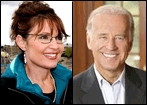 Since tonight's presidential debate–if it happens at all–will likely stray from its agenda of foreign policy issues, let's see what the vice presidential candidates have been up to in the foreign policy department this week.
Since tonight's presidential debate–if it happens at all–will likely stray from its agenda of foreign policy issues, let's see what the vice presidential candidates have been up to in the foreign policy department this week.
Reuters reports that Sara Palin visited with a variety of foreign leaders this week.
Only brief glimpses of Palin, running mate to Republican presidential nominee John McCain in the November 4 election, were permitted as she met with leaders from Georgia, Ukraine, Iraq and Pakistan who are in New York for the U.N. General Assembly.
Palin, who as governor of Alaska lacks foreign policy experience, could be heard chatting politely during the fleeting seconds the media was allowed to witness.
“There's plenty to do here, isn't there? Plenty to see,” said Palin to Iraqi leaders as she perched in an upholstered chair in a New York hotel, her hands folded in her lap.
“I have plenty to do at home also,” replied Iraqi first lady Hero Ahmed.
The exchange was warmer at Palin's meeting with Pakistani President Asif Ali Zardari, who greeted Palin with a huge smile, called her “gorgeous” and said he understood why many Americans “are crazy about you.”
Palin told reporters the day was “going great.”
“The meetings are very informative and helpful. A lot of good people share an appreciation for America,” she said.
Prior to Tuesday, when Palin met with Afghan President Hamid Karzai and Colombian President Alvaro Uribe, she had never met a foreign leader. Aides say she got her first passport in 2006…”
Palin addresses the passport, along with other foreign policy issues, in this interview with CBS Evening News’ Katie Couric.
The Democratic candidate Joe Biden also addressed diplomacy this week.
In a speech Wednesday in Cincinnati, Democratic Vice Presidential nominee Sen. Joe Biden reaffirmed his commitment to diplomacy as a critical tool of global engagement, saying:
“There's a short list of the forces shaping the 21st Century…. we have an ability to affect them – if we use the totality of our strength. That means maintaining the finest fighting force in the world – not pushing it to the breaking point… rebuilding our alliances, partnerships and international institutions – not disparaging them… strengthening our diplomacy — not disdaining it… and using our economic might, not putting it in jeopardy.”
[kml_flashembed movie="http://www.youtube.com/v/LH1z3UnXe78" width="425" height="350" wmode="transparent" /]